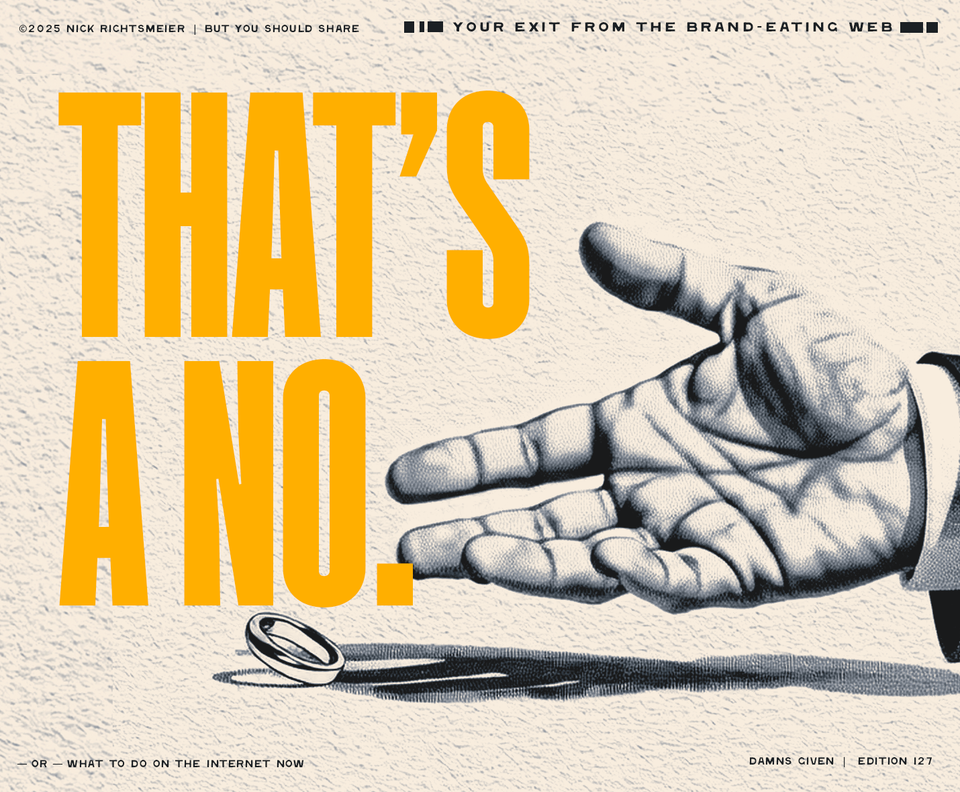
Edition 128 - OR - How to get people to buy sooner and more often
Don't just read these ideas week after week. Make them work for you. One 20-minute call with me could change your venture's future. Challenge me and I'll prove it.
Last week, I laid out on LinkedIn my general framework for where we are six months into Trump II and three years into the AI maelstrom. You can read it, but why, when I'll summarize:
- Things are far more stable for small and medium-sized businesses than the talk from talking heads.
- Most of the social and political uncertainty (which is total chaos and sometimes terrifying)—particularly in the U.S.—has little direct impact on day-to-day operations.
- AI implementations are limited and way less interesting or efficacious than headlines imply. More time is being wasted talking about AI than time being gained by using it. This could change, but should not impact your strategy.
- Huge opportunities to move aggressively, gain clients, and adjust to the new reality are being avoided because folks are waiting (foolishly) for things to "calm down."
Said simply, while other people are waiting for Ezra Klein or Chairman Powell or Sam Altman to tell them what's next, opportunities are emerging almost everywhere.
The Gift of Distrust
Nearly every value-forward industry (where you don't sell commodities and trust is essential to the transaction) is at varying levels of disassembly. Some, like marketing and agencies are nearing an existential implosion. Some, like wealth management, are in a compression period where the infusion of VC money and glossy commentary on "AI" is masking systemic realignment.
Most of this is due to a rising cynicism in the public. Distrust across industries is creeping up again. And the impact of the internet is multiplied by cultural milieu and AI overlays—all which tends to lead people to believe that they are more on their own, unsupported, and disconnected than ever.
Your customer believes they are in a vacuum of limited options that are either unsolvable or chronic until something major shifts.
You cannot solve this by posting another blog on how to stay positive in uncertain times.
The rise of distrust as a fundamental state of the American social and economic fabric has created all kinds of problems. We've put out a welcome mat to extractive elements bent on destroying injured industries and calling it progress. It has widened economic disparity. It has built a firewall of misalignment between leaders and their teams. I'm not here to gloss over the worst of it. It's real.
Nick, you really are a hypocirte you started this by saying things were better than they seem, and now this doomsday crap... which one is it?
As with all truths, it's both. Your customer, the one not buying from you, is mainlining a world giving them endless reasons to do nothing. Your competitors, in most cases, are wasting time waiting for that customer to "come back to normal."
That stall is an opportunity a mile wide.
Systemic cynicism and the social isolation it creates is a hunger for unfiltered perspective. While we distrust each other in general, we are searching for the exception in specific.
The magic is in knowing how to BE THE SPECIFIC.
Bad Habits Die Hard
The flush era of free money, sky high markets, before global pandemics and war (it so weird to write this unironically)... buyers behaved more linearly. They would explore, gain information, read your content, move into your selling funnel, jump through all your "discovery" hoops and then buy the big thing. The multi-seat subscription. The "full plan." Whatever your version of the "full-service" sale is.
People made a lot of money selling the big thing.
Everybody got used to building engagement models to get people squeezed through the funnel to buy the big thing without having to give any thought whatsoever as to how much trust was required for them to do so. Budgets were bigger, competition was looser, everybody generally believed we were here for a good time and that lines always eventually move up and to the right.
More than 50% of your prospects don't believe that anymore. They're capacity for perceived risky purchases, investments, hires, or financial decisions is halved or even quartered because they no longer fundamentally believe the best days are ahead. And there ain't nothing you can do to change that.
And yet, the selling process I see over and over again, depends on making marriage proposals on first or second dates. Contracted courting, too much selling, WAY too much marketing, and failed proposals everywhere.
The insane idea that we are turning to AI to solve for sales people who can't sell the marriage degrading into sales people who can't get dates is upon us. It will produce disastrous results.
Most firms are so accustomed to trying to put the wedding ring on as soon as they get you in the room that they are shocked to find out you're 45, single, and still living in Mom's basement. The incel-ification of American businesses is a real thing.
You have to fundamentally alter the sales process if you want to make it to the altar.
We work with firms to do 90-day transformation sprints in the six key areas proven to produce trust-made growth. You likely don't need an expensive fractional leader or one more long-term retainer agreement. You need a proven system for building and deploying growth strategy. And we can give it to you.
Essential Transformations
Your business likely needs a redesign of the entire client journey.
Fix First Contact: Abandon low-value "here's some stuff about us" or "look at our little Wikipedia-style article about something you could have gotten off ChatGPT." Doesn't matter how well it's written. No one cares. Your corporate social feeds are full of it. Your salespeople are leading with it. And your marketing team is wasting money mass producing. First contact needs to be as high value and ease of use as possible.
In the new world, where nearly all campaigns should start as one-to-few instead of one-to-many, you should have a system where it's more likely that your sales team is making first contact through referrals, events, LinkedIn network building, and community-creation tools than someone clicking on a link. Clicks cannot save you.
You have to build personalized trust here. Or the contact is short-lived.
Destroy the marketing/sales divide: The idea that marketing warms up the prospect or pulls them in market or "creates demand" and then hands them off to sales to close them is a trainwreck.
Stop thinking in terms of marketing/sales handoffs and start thinking about customized pathways with a balance of human and digital value delivery that uses the expertise of persuaders, creators, strategists, and writers across the CX. Build pods of skill across these disciplines, focused on building community and trust where your clients already are. And I don't mean what social media platform somebody told you they were on. I mean the relational networks where they already are practicing trust. (Sorry to the LinkedIn Evangelists Addiction Recovery Forum™️.)
Build a small speed-to-value, low-cost entry point: Sell small to earn the right to sell big. This is the one where I'm seeing the biggest impact. Firms that stop selling the "here's our big fancy engagement" as their entry point and pivot to a smaller, high-value engagement as their first sale are seeing results. Instead of "we're gonna charge you $10,000 to plan for your whole life in six easy meetings," they are delivering one solution to immediate pain. Or a 90-day plan with clear next steps. Or a one-week sprint.
We're not talking about making people pay for discovery. We're talking about finding creative ways to embed your discovery while you are delivering value.
- Look at your list of "we absolutely need to know this before we can work with someone." How can you reduce it by 80%? How can you deliver half of it step-by-step while providing real, up-front value?
- How could you design a low-barrier-to-entry product or service that gives people a taste of what you do, is priced competitively, and differentiates you from the field? (It must solve one real problem.)
- How could you turn your newsletter—a landing zone for updates, blog summaries, and podcast redirects—into must-read viewing for the 25 clients you need to close in the next year? What would it be if the only people who needed to read it were those 25 people? What if you had to do everything in your power to entertain, inspire, woo, and show how much they matter to you, instead of talking about yourself?
Our best clients are addressing these questions to win new business and break through their calcifying industry barriers. And it's working.
I'm booking now for the fall, so let's not wait to get this turned around for you.
Stay brains on, heart open, forward progress.
